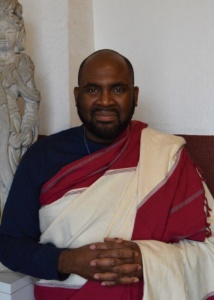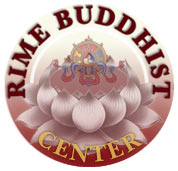Liberation through the messiness Lama Rod Owen’s visit to the Rime
by Matt Walsh, Yeshe Namkha Rangdröl (they/them)
 Lama Rod visited the Rime Center November 16-18 to teach on Liberation through Love and Rage. Important themes for me included developing a healthier relationship to our anger or rage (or any of the other afflictive emotions), embodied practice, and the importance of self-care on the path to becoming a Bodhisattva.
Lama Rod visited the Rime Center November 16-18 to teach on Liberation through Love and Rage. Important themes for me included developing a healthier relationship to our anger or rage (or any of the other afflictive emotions), embodied practice, and the importance of self-care on the path to becoming a Bodhisattva.
He explained that it is not anger itself that is unhealthy, it is our habitual relationship to it that is. We have a habit of instinctively reacting to it rather than wisely responding to it. We can develop that healthier relationship to anger by moving from saying “I am angry” to “I am having an experience of anger” to “anger is happening”. Then, looking deeply into our anger or other emotions, we can learn that these emotions are energy that the mind labels with “anger” or “sadness” or so on. Once we drop the label, we can productively use that energy.
We develop this healthier relationship with the energy of our emotions through embodied practice. Lama Rod taught that before Siddhartha became the Buddha, when he was engaged in ascetic practices, he was trying to bypass the body and embody himself in his mind. He emerged from deep concentration and discovered that he was sick, his body was broken, and he had gotten nowhere. This led him to see the need to pay attention to the body, to unite body and mind. Subsequently, Lama Rod showed us a couple practices for an embodied and wise relationship to the energy of our emotions.
Significantly, someone asked a question about the attention to the self and one’s emotions that Lama Rod was advocating, because it seemed to run counter to teachings about being selfless and engaging in self-sacrifice to benefit others. Lama Rod responded that in order to work with the Dharmic emptiness of the ego, one first needs to have a fully integrated and healthy ego, and at the moment, our egos are fragmented. We are not generally at the point where we can engage in the profound self-sacrifice of the Bodhisattvas. To that end, we need to engage in self-care. Self-care, he said, consists of those things we do for ourselves that renew us, empower us, and strengthen us for the work we do that benefits others in our communities. This is different from self-indulgence, where what we do for ourselves benefits no one else.
This highlights an important point that Lama Rod emphasized–and one that he had made last year as well–that we too often try to skip over the relative to the ultimate. We earn the ultimate by mastering the relative, the stuff of our lives in all its messiness. This message runs as a thread through all of his teachings.

